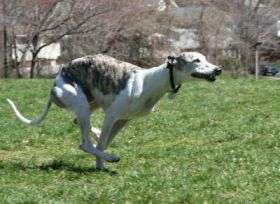Gene mutation linked to increased athletic performance in whippets

Whippets are bred for speed and have been clocked at speeds approaching 40 miles per hour over a 200-yard racing course. Scientists at the National Human Genome Research Institute (NHGRI), part of the National Institutes of Health (NIH), have now discovered a genetic mutation that helps to explain why some whippets run even faster than others.
Published in the open-access journal PLoS Genetics, their findings will make for a fascinating experiment in applied genetics and human nature: what will dog breeders do with this information, and what are the implications for human athletic performance?
A research team led by Elaine Ostrander, chief of the Cancer Genetics Branch in NHGRI’s Division of Intramural Research, reports that a mutation in a gene that codes for a muscle protein known as myostatin can increase muscle mass and enhance racing performance in whippets. Like humans, dogs have two copies of every gene, one inherited from their mother and the other from their father. Dr. Ostrander and colleagues found those whippets with one mutated copy of the myostatin (MTSN) gene and one normal copy to be more muscled than normal and are among the breed’s fastest racers. However, their research also showed that whippets with two mutated copies of the MTSN gene have a gross excess of muscle and are rarely found among competitive racers.
This is the first work to link athletic performance to a mutation in the myostatin gene, with Dr. Ostrander observing: "The potential to increase an athlete’s performance by disrupting MSTN either by natural or perhaps artificial means could change the face of competitive human and canine athletics." However, the authors stress that: "Extreme caution should be exercised when acting upon these results because we do not know the consequences for overall health associated with myostatin mutations."
Source: Public Library of Science
















